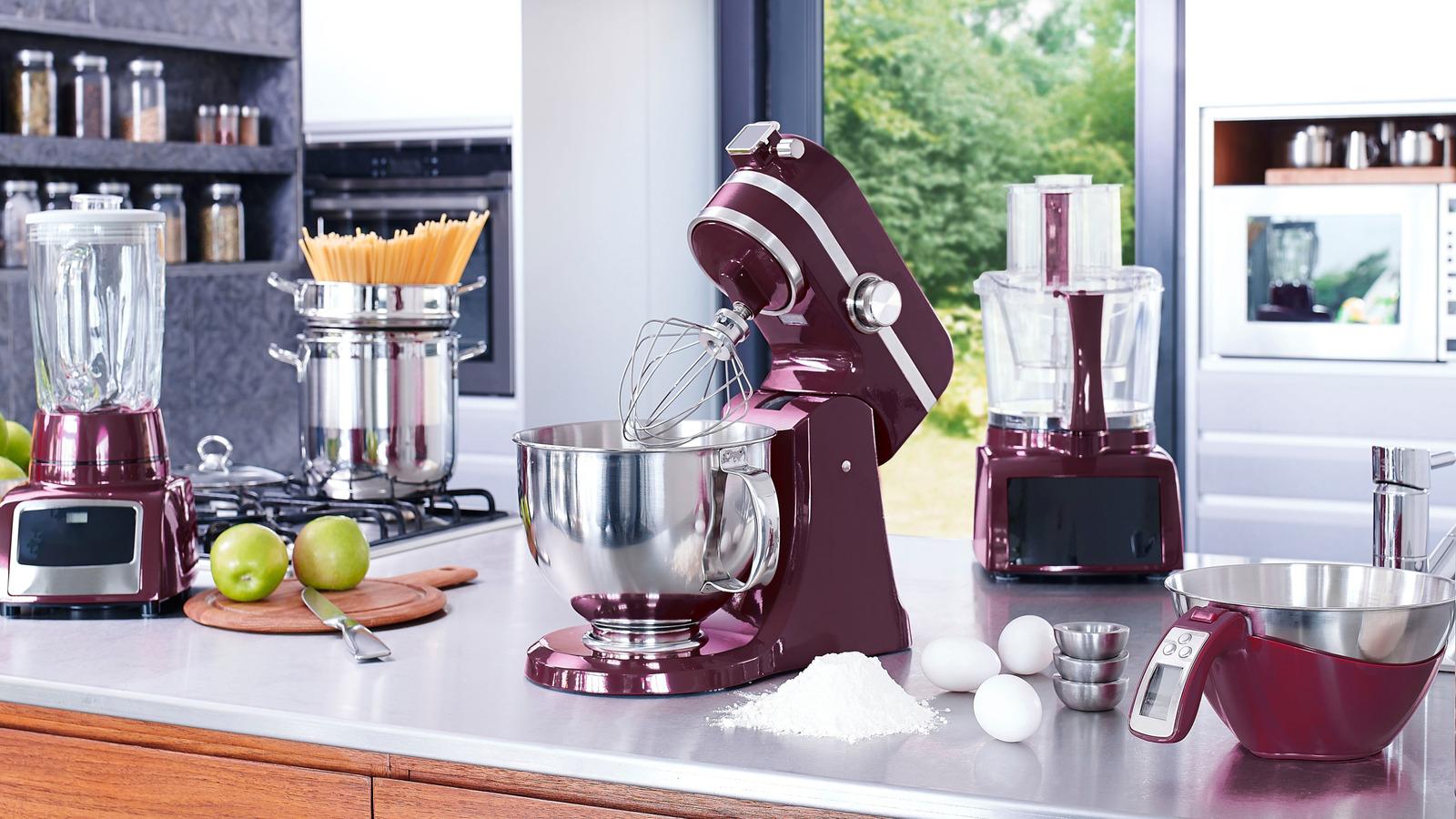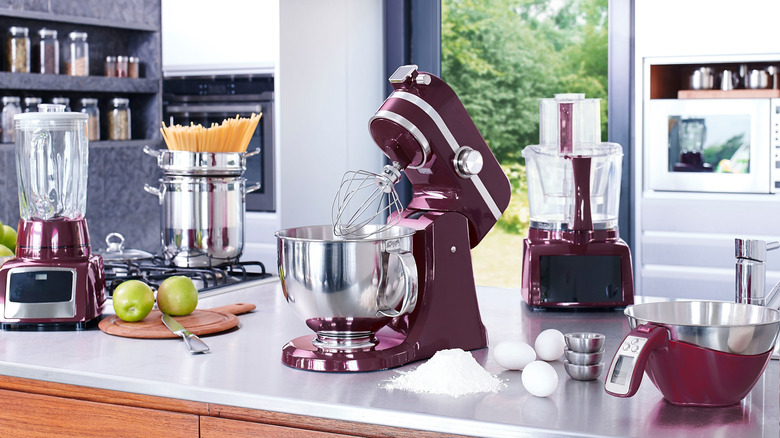
Muhammad Tabish Ahsan/Shutterstock
Kitchen counters work hard. They're a place to prep, cook, and serve. All too often they turn into storage space. However, there are some items that should never stay on your kitchen counters. They may have a shorter shelf life when left on the counter while others could even be safety hazards.
The trouble is, many of us leave things on our counters out of habit. A basket of produce, a frequently-used olive oil, cleaning spray — it might seem logical to leave these things out. But over time, what's meant to be a shortcut can lead to wasted groceries, unpleasant smells, or a counter that's more crowded than functional.
A few small adjustments can keep your counters clear, kitchen safer, and food in better shape. In this guide, we'll walk through 13 items that are best kept off your countertops and tell you why. Think of it as a practical decluttering session with benefits that go beyond appearances. With just a little rearranging, you'll free up space, cut down on waste, and make your kitchen a much easier (and healthier) place to cook.
Olive oil
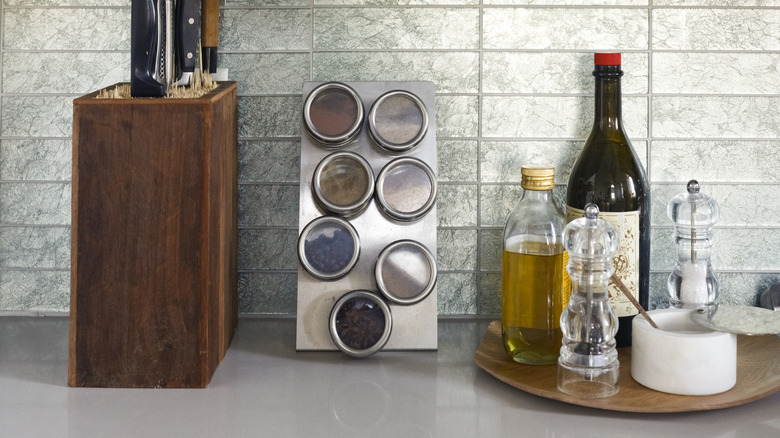
Julien Mcroberts/Getty Images
A sleek bottle of olive oil might look right at home next to the stove, but that's exactly where it starts to lose quality fast. Heat, light, and oxygen are the enemies of good olive oil. When exposed to them, the oil oxidizes and breaks down, leading to dull flavor and a shorter shelf life. That fruity, peppery note you expect from fresh olive oil can quickly turn flat when the bottle lives on the counter.
Instead, olive oil should be stored in a cool, dark place — ideally in a pantry or cupboard away from the stove's heat. Dark glass or opaque tins help protect the oil from light, but even those don't make it immune to degradation. Keeping the cap tightly sealed is just as important, since oxygen can sneak in and speed up spoilage.
If you use olive oil often, it's fine to decant what you need into a smaller dispenser for convenience, but refill it regularly from a larger, well-stored bottle. It's true of all olive oil, but you should be particularly careful with quality EVOO. Its flavors are more nuanced, so you might notice a change quicker, plus it's pricey. Maybe you just discovered you've been storing olive oil wrong this whole time.
Potatoes
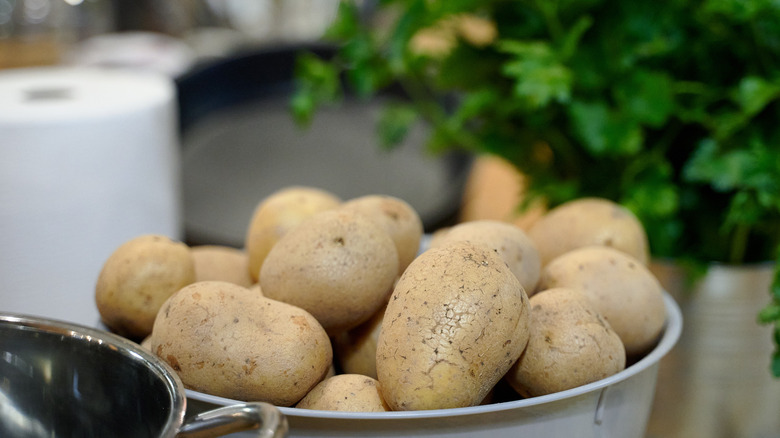
Sebastian Gora/Getty Images
The trick to keeping potatoes fresh for longer is not storing them on your countertop. Exposure to light causes them to develop green patches, which indicate the presence of solanine — a natural compound that can be toxic in high amounts. At the same time, warmth accelerates sprouting, shriveling, and decomposing, so a bag of spuds left out for too long can quickly go from firm and fresh to soft and bitter.
The best environment for potatoes is cool, dark, and well-ventilated. A pantry, cellar, or cupboard away from the stove is ideal. Mesh or paper bags help air circulate while still blocking light, extending their shelf life. When kept together, onions and potatoes give off gases that speed up spoilage, so although they need similar conditions, you'll want to keep them separate.
One common mistake is refrigerating potatoes. It seems like a good way to keep them away from heat and light, but that's not a good solution either. Cold (rather than cool) temperatures convert some of the starch to sugar, which alters both the flavor and the way they cook. So while the counter might seem convenient, it's worth finding potatoes a better home. With proper storage, they'll stay fresh for weeks instead of days.
Cleaning supplies
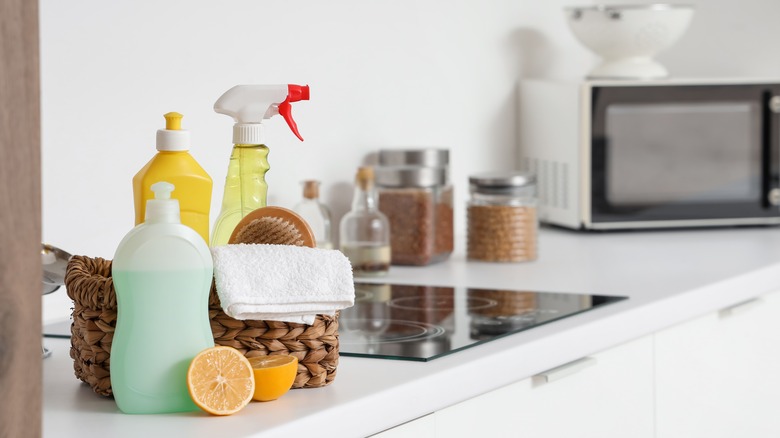
Pixel-Shot/Shutterstock
Sure, it seems practical to stash a bottle of all-purpose spray or a container of wipes right on the kitchen counter for quick access, but it's not a safe choice. Cleaning supplies contain chemicals you definitely don't want anywhere near food prep areas. If bottles leak or leave residue on the counter, those substances can come into direct contact with the surfaces where you chop, mix, and cook.
Beyond the health concerns, leaving sprays and bottles out in the open also contributes to visual clutter. Counters are prime real estate in any kitchen, and filling them with non-food items makes the space feel less organized and functional.
A better option is to designate a storage spot away from food zones — under the sink, in a utility closet, or on a dedicated shelf. If you like having supplies within reach, consider keeping a small caddy you can pull out when needed, then tuck away when you're done. This keeps your counters clear while still being convenient. You need cleaning supplies for your kitchen, but they don't belong in the middle of your cooking space.
Onions and garlic
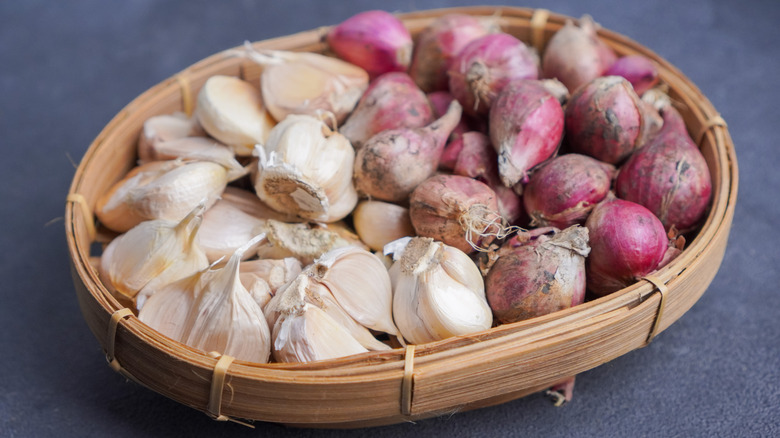
Wempy Dyocta Koto/Shutterstock
It's tempting to keep onions and garlic right on the counter, where they're easy to grab when a recipe calls. The problem is, those same conditions that make them handy also shorten their shelf life. Left out in the open, onions tend to sprout, soften, or develop mold far more quickly than they would in proper storage. Garlic, meanwhile, can dry out, become rubbery, or take on that sharp, unpleasant flavor that ruins a dish instead of enhancing it.
Both onions and garlic are happiest in a cool, dark, and well-ventilated place. On a sunny counter or under warm kitchen lights, they're pushed into aging faster than they should. If you've ever bought a bag of onions only to find half of them turning mushy within days, the culprit is probably where they're being kept.
Move them off the counter and into a better environment and you'll fix this issue. A pantry or cupboard away from direct sunlight is ideal. If you don't have one, a breathable basket or mesh bag tucked in a dark corner will do the trick. Just avoid plastic bags, which trap moisture and encourage rot. That's why Julia Child stored her onions in pantyhose. It sounds odd but they're breathable so moisture doesn't build up. With the right setup, you'll cut down on waste and make sure your onions and garlic are at their best.
Coffee beans
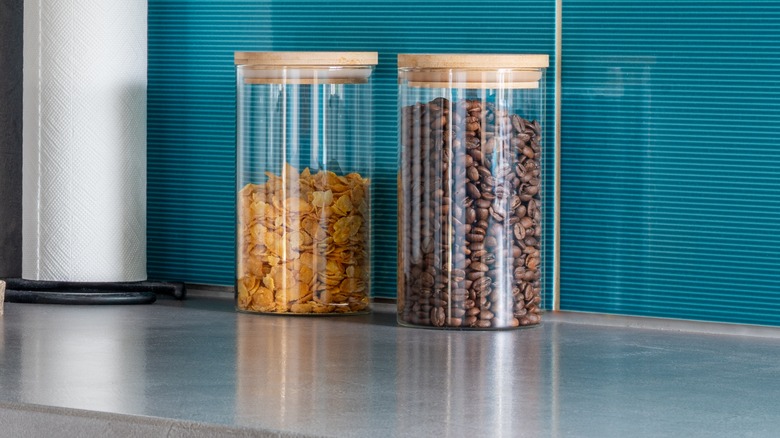
michnik101/Shutterstock
Keeping coffee beans on the counter seems harmless — after all, they're dry and shelf-stable. But in practice, leaving them out on the counter is one of the fastest ways to degrade flavor. Coffee suffers most from four culprits: oxygen, heat, moisture, and light. Even a small amount of airflow or sunlight through a window can dull the aromatic compounds that make a brew taste great. When beans are exposed on the counter, deterioration accelerates. Aroma dissipates, oils oxidize, and your coffee ends up tasting flat.
After roasting, coffee beans need some breathing room to off-gas carbon dioxide, but that process doesn't last forever. The optimal freshness window is relatively short. That's one reason why coffee bags often feature one-way valves: they let gases escape without allowing more air in. For day-to-day storage, the principle is simple: limit what gets in and out. Use an opaque, airtight container made of ceramic, metal or dark glass, and keep it tucked in a cooler, darker corner of your kitchen. Ideally, you should keep your beans in a pantry to avoid light exposure. So, keeping them out on your counter isn't the way to go.
For longer term storage, freezing is possible — but only if it's done right. Issues with freezing are among the many mistakes people make when storing coffee beans. For the best results, make sure the beans are sealed in an airtight container and avoid repeated freeze-thaw cycles.
Ground spices
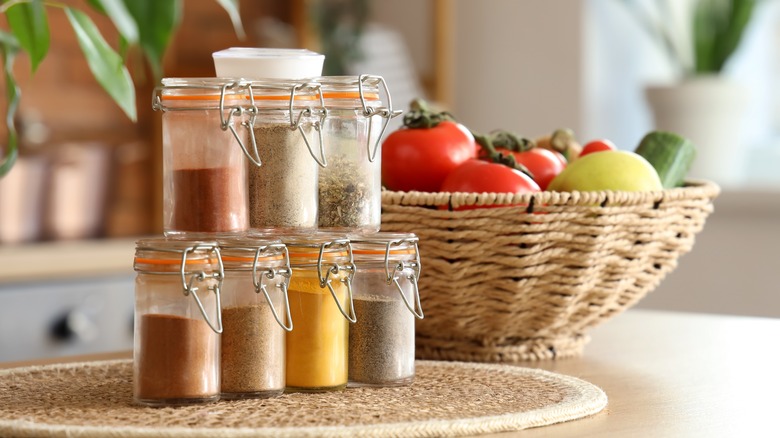
Pixel-Shot/Shutterstock
Ground spices lose potency fast when left out in the open. Heat, moisture and light degrade their essential oils, which means a jar on the counter isn't going to taste its best for long. That's why the moment you bring home a new spice, putting it in a dark, cool cabinet or drawer is a smart move. It's also the Padma Lakshmi-approved way to store spices.
Large, clear jars or racks on the counter may look good, but they expose spices to light and temperature swings that speed up deterioration. Many home cooks regret having their most-used jars sitting right beside the stove, getting blasted by heat every time the knobs click on.
A good practice is to buy smaller quantities more frequently rather than in bulk, especially for spices you don't use daily. That way, nothing sits around long enough to lose its spunk. When the spice aroma fades or the scent seems weak, it's time to refresh. Organized spice drawers and in-cabinet racks are better than counter-top displays, even though they're less convenient.
Cookbooks
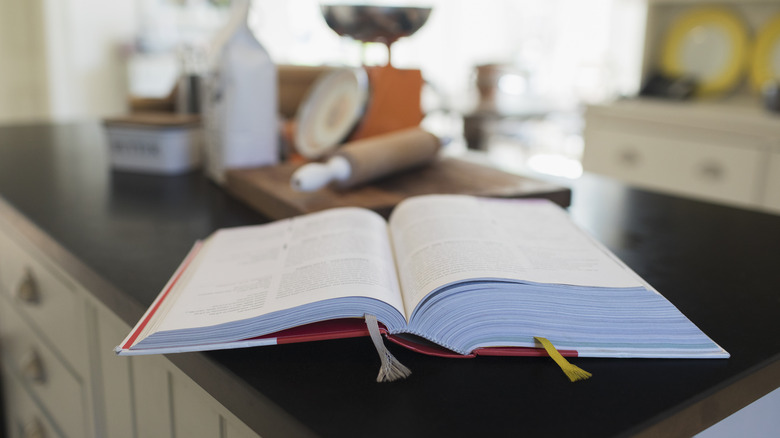
Caia Image/Getty Images
Cookbooks are beautiful, inspirational — and not well-suited to kitchen counters. That space might make them easy to grab, but it also exposes them to steam, heat, cooking smells, and splatters. Over time, that wear and tear makes them less useful and less attractive. There's loads of humidity in the kitchen, from boiling pots, dishwasher vents, steam, and so on. This works against paper. Pages can warp, bindings loosen, and cookbooks gradually deteriorate.
Instead of the kitchen, store cookbooks somewhere dry, stable, and away from direct heat or steam. A shelf in an adjacent dining area, a tall upper cabinet, or even a closed cupboard are all better choices than leaving them spread across the countertop. That way the pages stay crisp, the covers stay sturdy, and they last longer. It's okay to keep a cookbook on the counter when you're using it, but watch out for spills and splashes. And then return it to its usual spot when done.
Wine
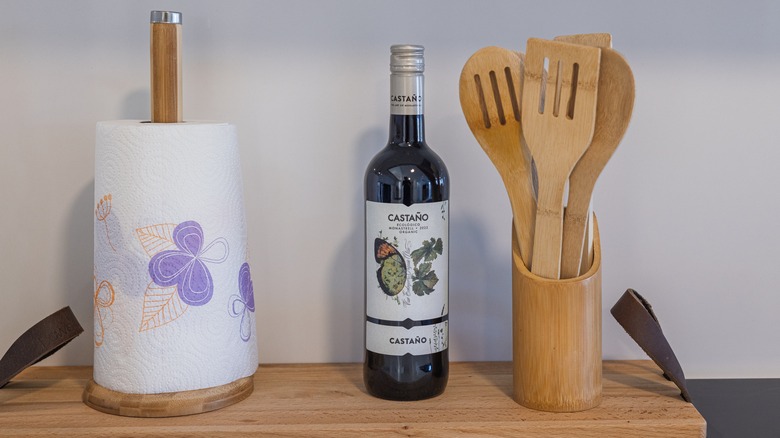
Chedko/Shutterstock
It's tempting to keep a bottle of wine on the counter. Or maybe having a countertop wine rack or collection of bottles is part of your kitchen décor. But wine is far more delicate than most people realize, and a countertop isn't a good place for it to live. Exposure to light, heat, and fluctuating temperatures can throw off its balance and accelerate spoilage. A bottle that sits out for weeks in a bright kitchen can start to taste flat or not at its best.
On the counter, sunlight through a window or heat radiating from nearby appliances can cause chemical reactions inside the bottle that dull both aroma and taste. And if your wine has a natural cork, standing it upright on the counter for too long risks oxidation when the cork shrinks.
So, you've been storing wine wrong this entire time. What should you do? Wine is best in cool, dark, and stable conditions, which is why it's traditionally kept in cellars. But, since most folks don't have their own wine cellar, you'll have to make do. For short-term storage, a pantry or cabinet away from direct light will do the trick, ideally with the bottle laid on its side. If you're serious about wine, a small wine fridge keeps bottles in optimal condition.
Handbags or backpacks
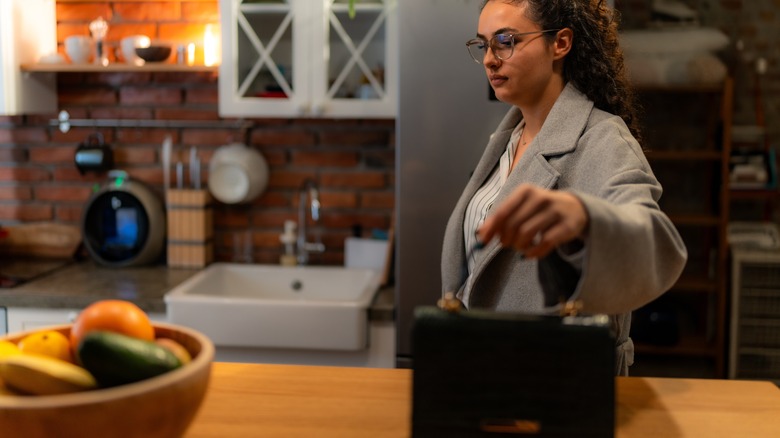
f.t.Photographer/Shutterstock
Dropping your handbag or backpack on the kitchen counter might feel convenient. It's a quick place to unload after a long day. But from a hygiene standpoint, it's a bad habit. Bags pick up bacteria and grime from subway floors, car seats, public restrooms, under your desk, and all those other spots you put them down without thinking. When you place them on the same surface where you prep food, you're introducing those germs directly into your cooking space.
Studies have shown that the bottoms of purses and backpacks can carry traces of everything from E. coli to mold spores. And because most people rarely clean the exterior of their bags, that buildup can stick around for months. Even if the germs aren't immediately harmful, they contribute to a less sanitary kitchen overall.
Instead, keep those bags away from food prep areas. Put them on a hook near the door, a mudroom bench, or a shelf in a closet. And every so often, wipe down your bag with the appropriate cleaner for the material to cut down on germs. Moving your bag off the counter is one of the easiest ways to keep your kitchen surfaces cleaner and safer, and it cuts down on clutter, too.
Nuts and seeds
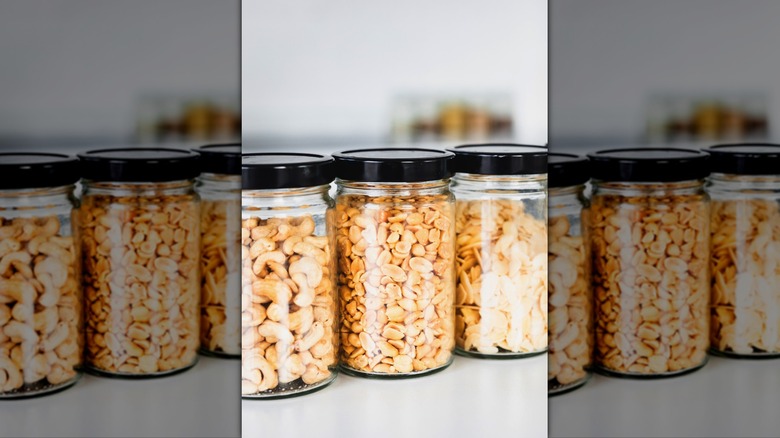
faithie/Shutterstock
Your nuts and seeds may look cute in glass jars on the counter, but their natural oils are quick to turn rancid when exposed to light, heat, and air. That's why a packet of almonds or sunflower seeds left out for a couple of months can suddenly taste bitter or off. Kitchen counters are bright and warm, so they're not a good place for storage.
The best place for nuts and seeds is a cool, dark environment. For short-term storage, it's fine to keep them in a pantry cabinet in an airtight container. But for longer periods, the fridge or freezer is better. Cold storage dramatically slows oxidation, helping keep the oils from spoiling and the flavors sharp. Nuts and seeds don't freeze solid, so you can scoop them straight out for baking or snacking.
If you buy in bulk, it's smart to divide the stash into smaller portions. Keep what you'll use within a few weeks in a sealed jar in the pantry, and tuck the rest into airtight containers or bags in the freezer. This way, you're only exposing small amounts to the elements at a time.
Small appliances you use infrequently
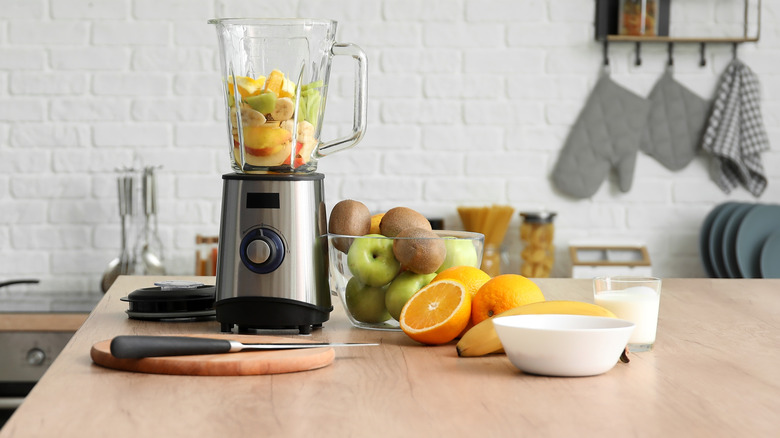
Pixel-Shot/Shutterstock
A coffee grinder you use once a week or a citrus juicer you occasionally get out to make fresh OJ shouldn't be living on your counter. Small, infrequently-used appliances take up precious prep real estate and turn countertops into storage spaces. Instead, store them where they're out of the way but still reachable when needed.
Before stashing appliances, clean and dry them thoroughly. Crumbs and moisture left inside can mold or attract pests. Store cords wrapped neatly and keep small attachments in labeled zip-top bags so you're not hunting for parts later. Slide-out shelves or cabinet pull-outs make retrieval painless, so you're more likely to put things back where they belong.
If cabinet space is limited, there are other options. Shelving units, above the refrigerator, or a slim rolling cart tucked beside a counter can hold appliances without crowding your main work surface. If it's something you use very infrequently, you might even consider storing them in a garage or basement. Storage bins can be great for small appliances, since you can fit more in than you would by simply lining them up on a shelf.
Large appliances
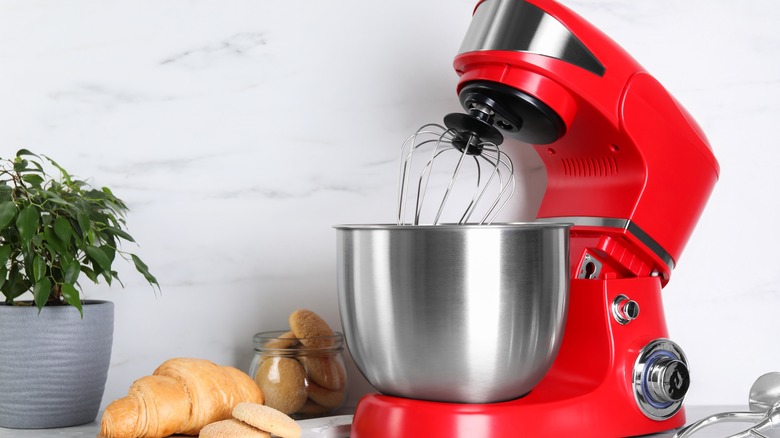
New Africa/Shutterstock
If you have a small kitchen, it's best to find another home for the kinds of medium-to-large kitchen appliances that many people might store on their counters. The stand mixer, slow cooker, or large cold-press juicer that looks like it belongs on display should be tucked away. Those heavy pieces not only eat valuable prep space, they also collect dust, crumbs, and oil splatters, and make your kitchen feel smaller and dirtier than it needs to be. Counters are for cooking and chopping. Large countertop appliances are better off stored until you actually need them.
If you don't use an appliance daily, tuck it away. A pantry shelf, a kitchen cabinet, or a deep drawer are all better homes than the work surface. If storage is truly tight, consider an appliance garage, a pull-out pantry shelf, or a dedicated spot on a utility shelf in an adjacent room or basement. Rolling carts and open shelving units can also keep machines accessible without monopolizing your primary prep area.
Keeping appliances stored also protects them from kitchen humidity and grease, which shortens their lifespans. If there's something you rarely use, ask yourself whether it's worth owning at all. You can also try rotating seasonal appliances out of the kitchen, so you aren't taking up storage space with the waffle maker you only use during the holidays.
Medication and vitamins
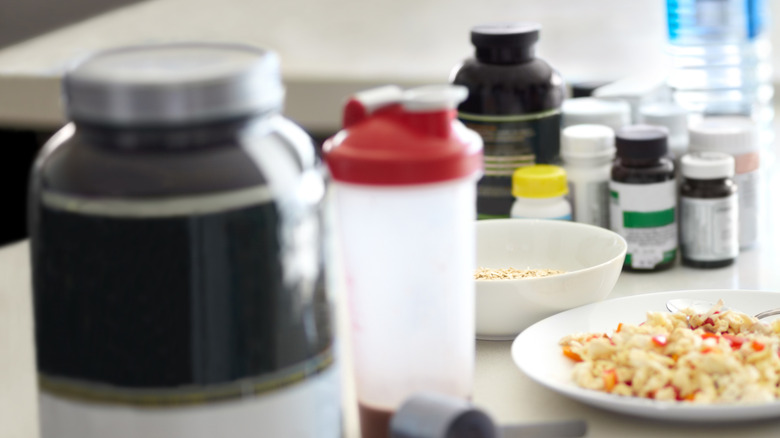
Peopleimages/Getty Images
Medicine and supplements deserve special treatment, and the counter is rarely the right place for them. The heat, light and humidity they're exposed to on countertops can degrade active ingredients in medications and vitamins, reducing potency long before the expiration date. For safety and efficacy, choose a cool, dry, and dark location away from where you cook.
Keep medications in their original containers with labels intact so dosage instructions and expiration dates are always clear. For prescription drugs that could be dangerous to children or pets, use a locked cabinet or a high shelf out of reach. If you have young kids at home, consider a lockbox. For vitamins and delicate supplements (probiotics, omega oil, certain enzymes), check the label — some require refrigeration, others need to avoid heat. When in doubt, follow the manufacturer's storage instructions or check with a pharmacist.
Don't store meds on counters where they can be knocked over or spilled on. Periodically review your stash and safely dispose of expired or unused items at a pharmacy take-back program rather than tossing them in the trash.



